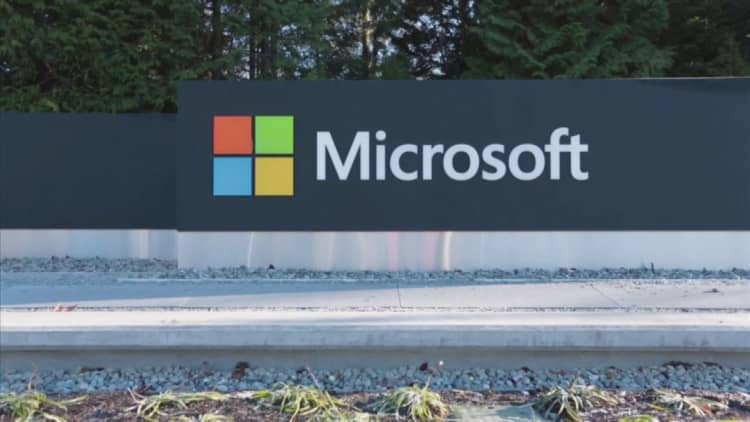
Microsoft just announced its heftiest acquisition, the biggest-ever in the software industry and among the largest in the history of technology.
None of those were good things, experts warned.
"Big deals don't work," said Roger McNamee, a career tech investor, who co-founded private equity firms Silver Lake and Elevation Partners, in an interview Monday on CNBC. "It's going to be hard to get the value out of this that I think they plan to get."
McNamee was referring to the $26.2 billion purchase of LinkedIn, a deal three times the size of Microsoft's biggest previous acquisition —the $8.5 billion purchase of Skype in 2011.
While Skype has worked out OK for Microsoft, at least from a usage perspective, the company's next-largest acquisitions have been total flops. The $6 billion purchase of aQuantive in 2007 and $7.2 billion acquisition of Nokia's handset business in 2014 both ended up as almost complete write-offs.
Microsoft is far from alone in struggling to make tech mega-deals work.

The $160 billion-plus AOL-Time Warner deal in 2001 quickly became synonymous with the internet bubble and its subsequent burst. Hewlett-Packard's disastrous $25 billion purchase of Compaq in 2002 was a major reason Carly Fiorina was pushed out as CEO three years later.
The other giant tech deals were completed recently, so it's too early to declare success or failure; Dell's $67 billion purchase of EMC closed in the first quarter, as did Avago's $37 billion acquisition of Broadcom.
Culture clashes, technology differences, a lack of product synergies and the need to please investors with excessive costs cuts are just some of the reasons mega-deals so often result in mega losses.
In fact, the first question Microsoft CEO Satya Nadella fielded on Monday's conference call was about this very point:
"You've had a tough track record in large M&A," Brent Thill, an analyst at UBS, noted, asking, "Why is this deal different?"
Nadella gave a classic CEO non-answer. He said LinkedIn accelerated the company's move to the cloud and gave it a much larger network, adding technology and a customer base that enabled some "transformative things that we can now do." Nothing about history, though, or why it was different this time.
The one obvious difference with the LinkedIn deal is that Nadella is now the one calling the shots, instead of his predecessor Steve Ballmer. Since taking over in early 2014, Nadella has led the purchase of only one billion-dollar company: the $2.5 billion purchase of Minecraft creator Mojang that September.
Microsoft's biggest deals
| Target | Year | Price |
| 2016 (pending) | $26.2 bln | |
| Skype | 2011 | $8.5 bln |
| Nokia | 2014 | $7.2 bln |
| aQuantive | 2007 | $6 bln |
| Mojang | 2014 | $2.5 bln |
| Navision | 2002 | $1.5 bln |
| Visio | 2000 | $1.5 bln |
| Yammer | 2012 | $1.2 bln |
Source: Source: FactSet, company reports
But Nadella was reportedly trying to scoop up Salesforce.com last year for upwards of $50 billion, a deal that would have added the biggest developer of cloud-based software to a company that was rapidly moving from desktop to web and mobile.
And let's not forget that Ballmer infamously tried and failed to buy Yahoo for close to $45 billion in 2008, back when the internet portal was still a force in online advertising.
Unlike fellow tech giants Alphabet, Facebook and Amazon, Microsoft wasn't born on the web.
Nadella, who led Microsoft's cloud division before taking the helm, has aggressively invested in the company's cloud infrastructure to compete with Amazon Web Services, as well as investing in Microsoft's Office 365 suite, which vies with Google's business apps.
Nadella said that LinkedIn, while keeping its brand and CEO (Jeff Weiner), would integrate with Office 365 and Microsoft Dynamics, the company's customer relationship management product that rivals Salesforce. The data on more than 400 million professionals registered with LinkedIn and the customer base of recruiters will give Microsoft a business that's not only expected to grow 25 percent this year, but also could help Microsoft sell its core products more effectively.
"You're going to see Microsoft emerge as a force to reckon with in sales force automation and compete with Salesforce head-on, as well as both grow and dominate the B2B marketing space," said David Yuan, a general partner at Technology Crossover Ventures (TCV), in an e-mailed statement.
TCV, which invests in public and private tech companies, snapped up shares of LinkedIn in the first quarter after the stock plunged more than 60 percent from its record high. Microsoft's purchase price marks a 50 percent premium over Friday's closing price and is about double the stock's low in February.
Still, it was 29 percent below the stock's high of February 2015.
LinkedIn vs. S&P 500
"Microsoft's bid is also notable in that it shows large incumbents are opening up their wallets to snap up publicly traded assets that have traded down," TCV's Yuan said.
The all-cash transaction was expected to be largely financed with new debt, which Microsoft Chief Financial Officer Amy Hood said would be raised "opportunistically during favorable market windows."
Microsoft has over $105 billion in cash and equivalents on is balance sheet, contributing to a $394 billion stock market value.
The money is there for Microsoft to do this kind of big deal, but until Nadella can prove history wrong, skeptics won't have a lot of faith in the company's ability to make it work.
Correction: The article has been updated to remove reference to Apple as a company born on the web.


